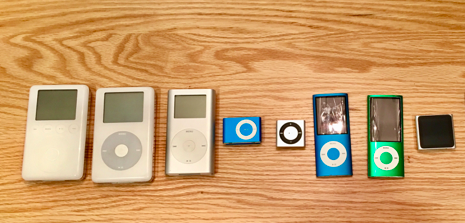You have /5 articles left.
Sign up for a free account or log in.
How many old iPods do you have sitting on a shelf, in a drawer, or in a box?
And what our collections of obsolete iPods tell us about the future of mobile learning?
My abandoned iPod collection spans the years 2003 (3rd generation Classic) and 2010 (Nano and Shuffle). My family and I, (which I think mostly means me), went through 8 iPods in about as many years.

I expect that my current phone (and iPhone 6S Plus) will be exchanged after 2 years. Some folks that I know have started to exchange their phones annually.
I interpret all these obsolete iPods and quickly exchanged iPhones as a positive development.
What this is telling me is that mobile hardware gets better quickly.
Assuming that we are not under some Apple reality distortion field that is driving us to rapidly upgrade our mobile devices - if indeed we are even somewhat rational consumers - then it must be that upgrading to new mobile hardware is worth the cost.
It must be that mobile devices have the potential for rapid improvement. Devices get thinner, lighter, and faster. Battery life gets longer. Memory gets bigger. Screens get sharper and brighter. Cameras become more powerful.
We no longer carry iPods because they have been replaced by apps. In the (near future), we may find that our smart phones are replaced by VR/AR enabled glasses. (That is the prediction of Robert Scoble and Shel Israel in their new book The Fourth Transformation).
I’m struck by how much change we’ve seen in mobile hardware, and how little progress we’ve witnessed in advancing mobile learning.
Much of our information lives have migrated to our phones. The exception to this trend seems to be education.
Learning has gone mobile at a slower pace than has gaming, entertainment, shopping, banking, and participation in social media.
Online courses continue to be designed first for the browser and the laptop. Educational content may be available on mobile devices, but mobile remains more a supplement to technologically-enabled learning than a substitute for the computer and the browser.
Is hardware the rate limiting step for transitioning to mobile learning?
Can we imagine a future mobile device that pushes us into mobile learning as definitively as the iPhone shifted listening off of the iPod?
Or is it the case that learning - and here I’m talking mostly about online education and credentialing - will never fully go mobile? That no matter how much better the hardware gets, we will always cling to our full-size keyboard equipped laptops?
By 2020 the world is expected to be home to almost 3 billion smart phones. Is mobile the technology that we’ve been waiting for that will radically bring down barriers to postsecondary educational access?
When, if ever, will technology-enabled learning and mobile become synonymous.
Can you come up with a more positive story for worldwide access to learning (and maybe even alternative credentialing) through mobile?
What are the abandoned iPods in your drawer telling you about the future of mobile learning?




